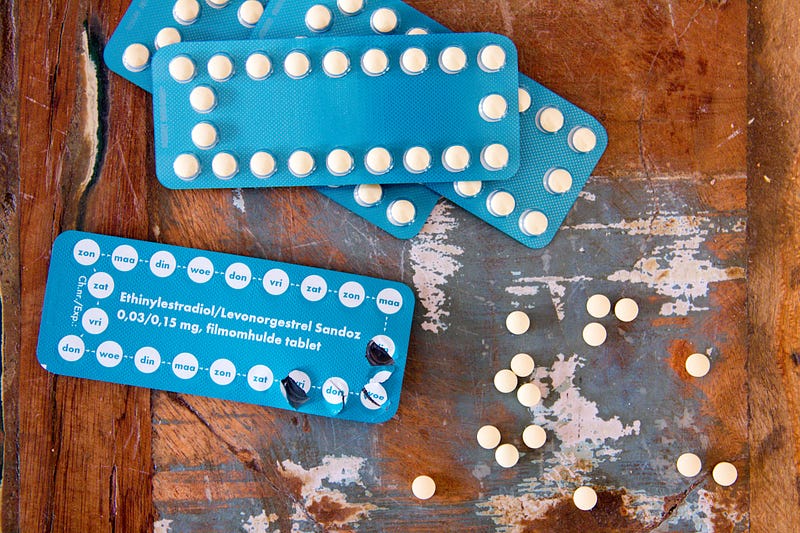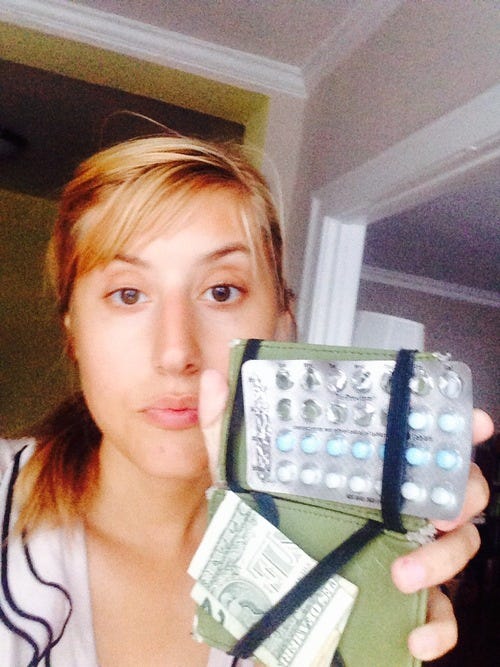The IUD Chronicles, Part 1: Why I’m Going Off Hormonal Birth Control
I’ve been on the pill for over a decade. It’s time to get reacquainted with a hormone-free me.
I’ve been on the pill for over a decade. It’s time to get reacquainted with a hormone-free me.
I’ve been on hormonal birth control, in the form of a daily pill, since I was 18 years old. I have never had a sexual relationship without it. I have never lived on my own, worked a job, dated, or traveled without it. I wasn’t a fully-formed adult when I started taking the pills, so I have no idea what an adult me without hormonal birth control is like.
I took my first hormonal birth control pill in January of 2007. I had a boyfriend of a few months, Tom, and he wanted me to get on them. At first I loathed the idea. Taking a daily medication that would alter my body chemistry, emotions, period volume, and boob size seemed terrifying and patriarchal. Knowing that it was my boyfriend’s idea made it even worse.
But, the week after the first time Tom & I had sex, I managed to convince myself I was pregnant because my period was a day late (even though we had used condoms and Tom hadn’t even orgasmed). I found myself shaking in the middle of a CVS on The Ohio State University’s campus, too scared to ask an employee to unlock the pregnancy test case. I went back to work instead, crying, and bought myself some sushi on the way, telling myself that if I was going to abort this fetus that was no doubt lurking inside me, I might as well treat it to some good food first. I got my period like an hour after that.
Having my hormones fucked with was scary and squicky. But carrying a child to term was mortifying. So I made an appointment. I took the pills.
— — — —
I have taken a daily pill at precisely 7:00 pm, without fail, for years and years and years. I am religious in my adherence. Estimates of the birth control pill’s efficacy are always tainted by the pill-taker’s “error rate” — the days that they miss, or take the pill hours late, or take the pill, but then throw it up after a night of binge drinking. I didn’t fuck up like that. Not ever. I kept my birth control pack in my wallet and programmed a loud, pinball-machine alarm into my phone. I took my pills on trains, in cars, at dinner tables, in front of college classrooms, around the Christmas tree at my grandmother’s house, anywhere I had to.
I took pills that fell on the floor. I dry-swallowed them without hesitation. I adjusted my alarm when I traveled to a different time zone. I knew that the pills came with a three-hour “window”, so I didn’t have to be actually factually perfect and always unfailing take it at 7:00 pm on the dot, but I did. I always kept a backlog of a pack of pills or two. I looked ahead at my schedule and made sure my prescription was always current, with several refills to spare. There would be no chance-taking.
I knew I came from a fecund family. My mom warned me, once, that she got pregnant the very month she stopped taking her own birth control pills. Both times. All my aunts and cousins had gobs of kids, and seemed to produce them so easily. What’s worse, I’d always been told that some day I’d want some of my own, despite endless protests that having babies was disgusting, selfish, unfair, not for me. As a child, I believed that girl babies were born already pregnant, and that eventually the tiny babies inside them would grow and blossom into real infants. I thought this was something you had no control over. Babies were a bullet train rushing toward me, and I was tied to the tracks.
(As it happens, babies, pregnancy, and all things womb-y are some of the largest triggers of my gender dysphoria. This isn’t the case for all afab trans people, of course. But for me, nothing feels more wrong/unfair/dissociated from my identity than the making and birthing of kids).
So I took birth control, religiously, and I was thankful for it.
— — — —
But it’s not perfect.
I’ve known for a few years now that hormonal birth control fucks with my emotions. It’s something that people on the medication have said for decades, though doctors are only just beginning to document and lend credence to their concerns. BC pills are a miracle, a liberator, a life-saver, but they also can cause depression and anxiety. Some people report it worsening feelings of insecurity, neediness, or paranoia.
I didn’t want to believe that was me. It seemed so pathetic, to be so easily influenced by a tiny little tablet. It felt like a sexist stereotype to become weepy and desperate the week before my period. I didn’t want to admit I was ruled my hormones. So for years, I tried to ignore and obscure the fact that I was miserable approximately 25% of my life.
The truth is, I am at least influenced by my hormones, as all people are. Part of what helped me accept this was getting to know a lot of trans people who have been, in ways large and small, influenced emotionally by the hormone replacement therapy they are on. Biology is not destiny, but biology provides the mechanisms through which destiny is expressed. We have bodies, and we have hormones coursing through them, and those hormones tell us a bit about how to feel, where to grow, when to fuck.
I have been tracking how BC affects my mood, my body, my libido, and my periods, for quite a few years now. I know without a doubt that the medication takes an emotional toll. On the third week of pills, when the hormone dose is the highest, I am irritable, sad, babyish, and insecure. My crying jags become unceasing, frantic, out of my control. A dark, heavy sorrow follows me, making daily tasks a sad slog.
It’s during that week that I start fights about things that have been bothering me for a long time. During that week, I feel hopeless, pathetic. I am sure that my partner Nick doesn’t like being around me. I’m sure I’m a failure and that my life is wasting away. I have no energy. I feel simultaneously too old to make anything of my life, and too young-at-heart to take charge of my own circumstances. I am unempowered, lonely, yearning to feel loved but unable to actually connect with any affection I am given.
Like any good depression, this high-hormone dysthymia convinces me that I always felt this way, and that this is how the world is. At my worst, I feel like I’m never going to get better and that life has nothing good in store for me. This is not a mood “swing” (I really loathe that term); it’s a whole week of sinking depression, my mood going down and down as the number of doses accumulates, until I’m an absolute wreck by Saturday or Sunday evening of that week.
The quality of this hormone-fueled depression is influenced by my actual life: If I’m already sad about real-life things, my brain latches onto them and plummets downward, taking my mood to new lows. If I’m around people, busy, with things to look forward to, I might barely notice the sadness at all (until I’m alone or something bad happens). If I drink, the depression is there, waiting for me, ready to pounce an hour or two after my first sip. If I’m worried about work, or resenting my family’s Republicanism, or feeling insecure about my appearance, or sorrowful about how busy my partner is, I know those feelings with froth up and overflow by the end of my third week of pills.
I dread the third week of pills. I think about skipping them, or throwing them out. When I’m on the placebo week of pills, I feel clear-headed, secure. I don’t cry too easily. I’m not lost in my own self-loathing or prickly with rage. I can work, and smile, and make new friends. It grueling to switch between two selves so quickly. It’s horrible that every high note is plagued by the knowledge that in a few weeks’ time I will invariably be miserable again.
— — — —
This is important: birth control pills do not make a person irrational. They do not give a person opinions or feelings they wouldn’t otherwise have. If someone on birth control (or someone about to have their period) picks a fight with you, the topic of the fight is not “nothing”. It’s very much something they were already concerned about. Hormones do not plant ideas or concerns or hurts into your head. They just make it harder to disengage from them. For some people. So never suggest to an upset person who happens to be on birth control that their feelings are created by the birth control. My soul will psychically kill you, wherever you are, if you do that.
— — — —
There are other issues with the pills that don’t loom quite so large. They’ve made my boobs way more large. That can be a painful, cumbersome, and dysphoric experience. This worsens, naturally, on week three of the pills (hereafter referred to as Hell Week). In Hell Week, the hormones are the highest, so breasts get puffy and hypersensitive. Sometimes they hurt quite a bit. Sometimes this change is attended by bloat in my stomach or thighs.
I have some Body Image Issues, but I’m working on them. My primary way of working on them is by disengaging from them. The less I attend to what size my body is and what it looks like, the better I feel. For the most part, I have stopped monitoring my chest and hip and thigh size, so I don’t always notice the increases that inevitably come during my birth control’s Hell Week.
Stopping birth control is not a bid to lose weight or change my body in substantial ways. Right now, I’m mostly at peace with what I have. I believe the solution to my particular crop of body image issues is to stop focusing on my body so much; trying to alter those body parts will just draw my attention back in, and worsen my feelings and eating disordered behaviors. That said, I imagine there will be a benefit to not having my chest balloon up every four weeks anymore. At the very least, I will be more comfortable.
— — — —
Birth control never really tanked my libido, I don’t think. My desire comes and goes. There are days or weeks when I am insatiable and weeks or a month where I couldn’t care less. That’s okay. It’s what I’m used to. I never noticed a decline in desire when I started taking the pills.
That said…
I do wonder how horny I’ll be, off hormones.
I’ve never known my adult, hormone-free self. Never met this person. This person has never been allowed to naturally exist. I’ve heard a lot of other people describe what has happened to their sex drives, when they’ve taken on an influx of estrogen (both afab people on birth control, and trans women on HRT): sexuality becomes more emotional and less visual, supposedly. It becomes less of an immediate need, more of a notional, experiential thing.
I don’t know what my sexuality is like off of BC, but I’m assuming it will move away from that direction. I guess I’ve never been a relentless horn dog. I guess sex is more experiential and emotional than it is some burning, hungry animal need. Well, no actually that’s not entirely true. Some times it’s one, sometimes it’s the other. Sometimes it’s both. I don’t fucking know man.
I’m looking forward to seeing what my unalloyed libido is like, though.
— — — —
Hormonal BC and I have lived together in relative peace for over a decade. BC has been the devil I’ve known, protecting me from the horrors of pregnancy with relative ease. I’ve had to endure a lot of tears and misery for want of a better alternative. And for over a year now, I’ve considered that alternative with excitement and fear. I’m getting a copper IUD. I look forward to meeting my no-hormones-added adult self. I’m curious about whether I’ll get acne again. I wonder if I’ll be pants-splittingly horny all the time.
Most of all though, I’m scare of the pain of IUD insertion. That’s what has kept me from trying it out, all this time. People say it feels like period cramps. Other people say it feels like going into childbirth contractions. I don’t even like getting pap smears. No one does, of course, but for me it’s a gender dysphoric experience in addition to a discomfiting one.
I don’t want to lay in bed all day with a heating pad while my body convulses around the little t-shaped piece of metal shoved in my cervix. I don’t want the strings on the end of the IUD to jab my partner in the dick. These things happen. They happen to people all the time. I don’t want to go through all this trouble and then find out I’ll need to have the damn thing removed.
To find impetus to change, you must suffer so much in your present circumstances that the pain of remaining the same exceeds the pain of trying something new. And I’ve finally reached that point. I cannot keep living in acute distress and boundless sadness every four weeks. I’m always happiest during my period week (when the birth control pills are hormone-free placebos) and the first week of pills (when the hormone dose is low). By week 2, I can feel the discomfort and sorrow setting in. By Hell Week, life is terrible, I’m pitiful, and nothing will ever get better.
I have lived this pattern every month for years. I am ready to take a risk. But it’s hard to see these things clearly. Emotional fluctuations are subtle, at times. We adjust to changes in our body’s chemistry; we make the fresh hell our new normal. It took me years to realize my BC was causing my crying jags and miserable depression. To avoid a similar lapse in self-awareness, I am documenting this whole process. I will be blogging regularly about topics such as the process of getting the IUD, how the insertion felt, how I’m coping with using it as a birth control method, changes to my skin, my period, my mood, and my libido, and so on.
This is an anecdotal account. It cannot tell you what will happen if you get an IUD, or get on hormonal birth control, or stop hormonal birth control. At the very least, I hope it helps me monitor the changes I experience, and helps me connect with other people whose experience overlap in various degrees.
— — — -
This is Part I in an ongoing series documenting my switch to non-hormonal birth control. In Part II of this series, I outline some of the changes I expect to experience after stopping hormonal birth control and getting a copper IUD.





